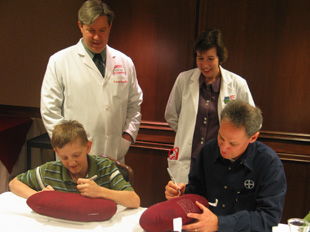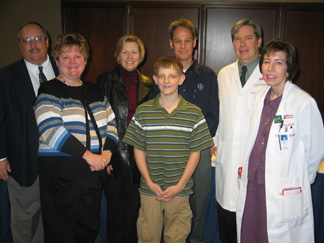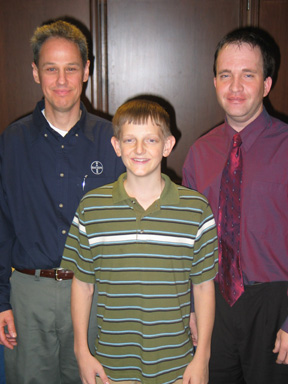 |
Drs. R. Brian Stevens and Lucile Wrenshall with kidney recipient Jordan Shaw, front left, and kidney donor Tom Falsey. |
The area’s first anonymous living kidney donation recently took place with transplant surgeons from UNMC taking a kidney from a 48-year-old Kansas man and transplanting it into an Omaha teenager.
“I knew I couldn’t save the thousands of people who are waiting for a kidney, but I could save one. That’s a start,” said donor Tom Falsey of Overland Park, Kan.
Right now in this country, nearly 60,000 people need a kidney transplant. The average wait nationwide for an organ is a year and a half, but some people wait as long as three to four years. For patients like 16-year-old Jordan Shaw the wait was filled with anxiety.
“Every night I’d be a nervous wreck because they told me that most transplants happen at night. If the phone rang after midnight, I’d wake up shaking,” Jordan said.
 |
Left to right: Joel Shaw, Carol Shaw, Joyce Falsey, Jordan Shaw (recipient), Tom Falsey (donor), Brian Stevens, M.D., and Lucy Wrenshall, M.D. |
“They led us into a room and when we saw the oncologist’s name badge, we knew we were in for a fight,” said Joel Shaw, Jordan’s father.
Cancer, and the radiation and chemotherapy to treat it, was the beginning of a medical journey that years later found Jordan on dialysis and in need of a kidney transplant. His days in dialysis were filled with early morning trips to the hospital followed by school. Then, out of nowhere came a donor that Jordan and his family did not know – a stranger who wanted to give Jordan a kidney.
|
|
It was a gift that Falsey planned to give his nephew but couldn’t. Falsey went through the extensive medical testing required for live kidney donors so he could donate to his nephew Aaron Schurman. The final phase of that testing showed some incompatibility and Aaron’s sister, Michelle Desler, a UNMC research technologist, turned out to be a better match. Aaron’s transplant took place in April 2002 and he is doing well.
“Once I decided to donate to Aaron, to me that kidney was already gone. When it was determined we weren’t a perfect match, I thought, why not donate it to someone else who needs it,” Falsey said.
But during the time that Falsey thought he would be donating his kidney to Aaron, his parents, who would have been with him in Omaha, were killed in a car accident in Arizona. It was a turning point for Falsey who felt more compelled than ever to donate his kidney to anyone who needed it.
 |
Left to right: Tom Falsey, Jordan Shaw and Aaron Schurman. Aaron is Tom Falsey’s nephew who has received two previous kidney transplants. |
“Anonymous donation is something we’ve considered for awhile, but we needed to make sure we had the trained staff and resources ready to take on such an important endeavor,” Dr. Stevens said.
An improved surgical technique that allows doctors to remove a donor kidney laparoscopically is one reason that such a program is even possible. The surgery uses three small incisions instead of a big one, which is easier on the body, reduces post-surgical pain and shortens the recovery time.
Dr. Stevens estimates that the anonymous donation program could increase the number of transplants performed at The Nebraska Medical Center by up to 20 per year.
|
|
“I believe the public is becoming more aware of the need for organ donors. We are seeing a definite rise in the number of friends donating to friends, but anonymous donation is still unusual,” said Lucile Wrenshall, M.D., a transplant surgeon and associate professor of surgery. “We are very grateful to Tom Falsey for his tremendous generosity towards Jordan. It is through the efforts of people like Tom that friends and relatives may be moved to donate to their loved ones.”
That is a trend that Falsey is working to build. Since becoming a donor, Falsey has taken up the cause of organ donation talking to anyone who will listen and establishing a fund through the University of Nebraska Foundation to help pay for the cost of donor medical testing and related research.
Meanwhile, Jordan Shaw is back to school and enjoying life off dialysis thanks to the kindness of a stranger whom Jordan calls very brave.
“Some people give money to help others but this person made the decision to go under the knife to give me a second chance at being a teenager,” he said.